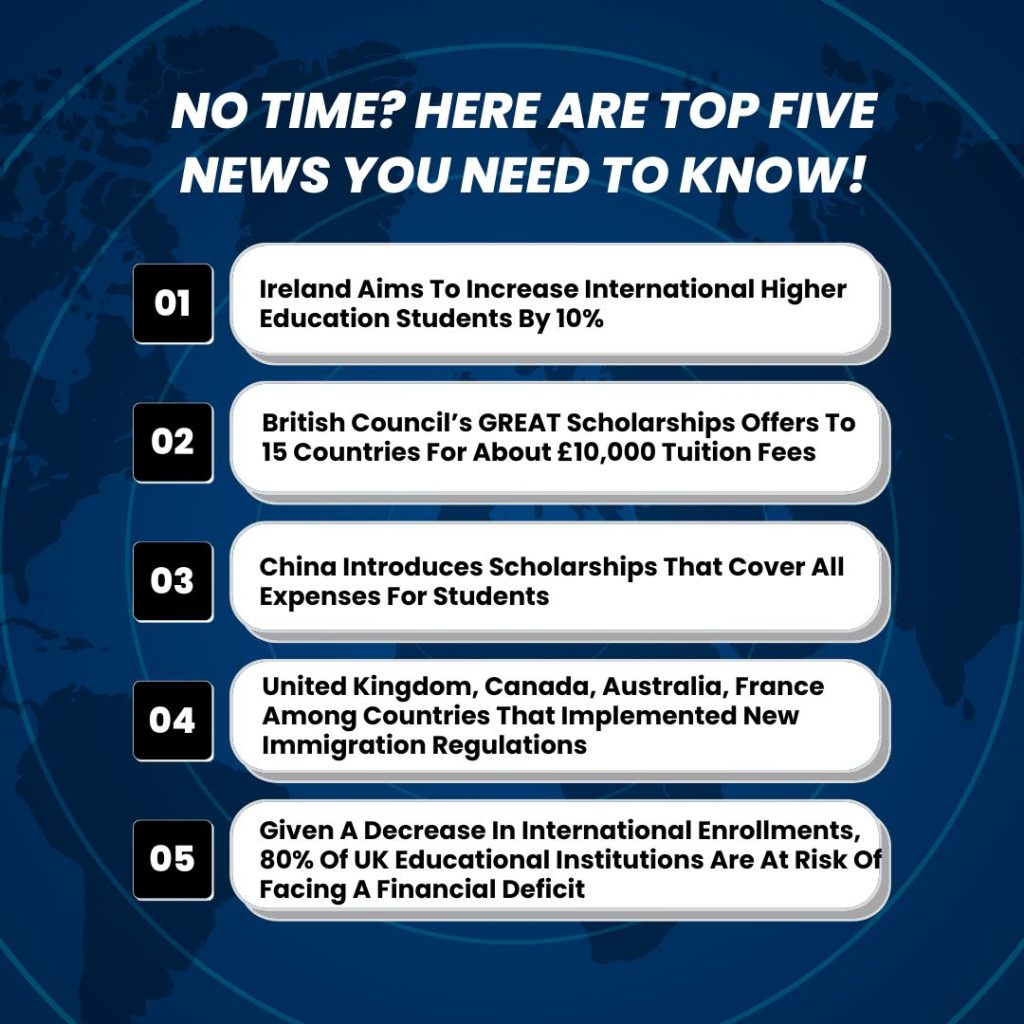UniNews serves as your fortnightly digest, providing essential updates on international education, study abroad opportunities, and the latest news to navigate your global academic journey.

In this ever-changing landscape of global education, Ireland reveals plans to introduce the International Education Mark (IEM) and aims for a 10% increase in international higher education students under the Global Citizens 2023 – Ireland Talent and Innovation Strategy. Concurrently, diplomatic tensions impact Canada’s international education sector, particularly with an 86% drop in study permits for Indians.
Meanwhile, the UK Higher Education sector faces financial challenges, with 80% of providers at risk if international enrollments decline. On a positive note, China opens fully funded opportunities through the Shanghai Government Scholarship, showcasing its commitment to global education and cultural exchange.
Ireland Aims To Increase International Higher Education Students By 10%
Ireland aims to increase international higher education students by 10% under the Global Citizens 2023 – Ireland Talent and Innovation Strategy. The plan includes introducing the International Education Mark (IEM) system, a scholarship scheme for PhD students, global promotion initiatives, and a UK exchange program. The six core pillars of the strategy focus on becoming a preferred destination for international learners, fostering talent and innovation, and thought leadership in policy.
The government plans a moderate 10% growth in international student recruitment, addressing capacity concerns. Additional measures include support schemes, metrics for student impact, online education exploration, and investment in technological universities. Ireland also intends to use its 2026 EU Council Presidency to develop the next Erasmus+ mobility program. Minister Harris emphasises the strategy’s role in maintaining Ireland’s global, diverse society and providing educational opportunities while addressing economic and societal needs.
What is the International Education Mark (IEM) system?
The International Education Mark (IEM) system is a new statutory quality framework for higher education and English language providers, set to be launched in the first quarter of this year. It is part of Ireland’s strategy to enhance the quality of international education.
How will the scholarship scheme for PhD students work?
The scholarship scheme for PhD students, known as “Innovate for Ireland,” is described as an ambitious partnership between industry and government. It aims to attract high-calibre PhD students to undertake research and innovation in Ireland, focusing on addressing national and global challenges such as climate change, pandemics, water poverty, and cybersecurity.
What are the six core pillars of the Global Citizens 2023 – Ireland Talent and Innovation Strategy?
The six core pillars of the strategy are:
- A first-choice destination for international learners, researchers, and innovators.
- Talent and Innovation at the heart of Ireland’s global footprint; Global citizens in multi-national, multi-cultural workforces.
- Thought leadership in talent, innovation, and science policy.
- Building capacity and increasing engagement with international partners.
- Balancing inbound and outbound student mobility.
- Maintaining Ireland’s global, diverse society and providing educational opportunities while addressing economic and societal needs.
British Council’s GREAT Scholarships Offers To 15 Countries For About £10,000 Tuition Fees
The British Council’s GREAT Scholarships present a global opportunity for students from 15 countries, offering £10,000 for tuition fees in various one-year taught postgraduate courses across 71 UK universities. The 2024-25 academic year will see 210 scholarships awarded, encompassing institutions like the University of Bristol, University of York, University of St Andrews, University of Manchester, University of Warwick, and University of Birmingham.
Open to applicants from diverse countries, including India, Malaysia, Pakistan, Bangladesh, Turkey, Nigeria, and more, the scheme has specific entry requirements for each country and course. Application deadlines vary by university and course, generally falling around March, April, and May 2024. Additionally, two specialised scholarships are available for justice and law, as well as science and technology postgraduate programs.
What is the scope of the British Council’s GREAT Scholarships, and how do they benefit students?
The GREAT Scholarships by the British Council offer global opportunities for students from 15 countries, providing £10,000 for tuition fees in one-year taught postgraduate courses across 71 UK universities.
Which universities are participating in the GREAT Scholarships for the 2024-25 academic year, and how many scholarships will be awarded?
Participating universities include the University of Bristol, University of York, University of St Andrews, University of Manchester, University of Warwick, and University of Birmingham. A total of 210 scholarships will be awarded.
What are the application deadlines for the GREAT Scholarships, and when will the course start for successful applicants?
Application deadlines vary by university and course, generally falling around March, April, and May 2024. The courses for successful applicants typically commence in September 2024.
China Introduces Scholarships That Cover All Expenses For Students
The Shanghai Government Scholarship (SGS) is currently open for applications for the 2024-2025 academic session in China, offering fully funded opportunities for undergraduate, Master’s, and Ph.D. degrees. Open to global candidates, the scholarship covers tuition, living expenses, and other essentials, demonstrating China’s commitment to global education.
In collaboration with 34 Chinese universities, the SGS aims to promote academic excellence and cultural exchange, supporting international students in pursuing higher education in Shanghai. Established in 2006, the scholarship underscores China’s dedication to fostering an inclusive educational environment and strengthening its position as a global educational hub.
What are the eligibility criteria for the Shanghai Government Scholarship?
The eligibility criteria for the Shanghai Government Scholarship (SGS) are not provided in the given content. Additional information from the scholarship’s official portal or guidelines is needed to answer this question.
How can I apply for the Shanghai Government Scholarship?
To apply for the Shanghai Government Scholarship, prospective students are encouraged to initiate the centralised application process by visiting the Shanghai Government Scholarship Portal. Detailed application procedures and requirements are likely available on the official portal.
What are the benefits of the Shanghai Government Scholarship?
The benefits of the Shanghai Government Scholarship include fully funded opportunities for undergraduate, Master’s, and Ph.D. degrees. The scholarship covers tuition, living expenses, and other essentials, demonstrating China’s commitment to global education and supporting international students in pursuing higher education in Shanghai.
United Kingdom, Canada, Australia, France Among Countries That Implemented New Immigration Regulations
The Indian Student Mobility Report 2023 indicates a rise in Indian students pursuing higher education abroad, reaching approximately 1.3 million in 2023. Countries like Australia, the UK, Canada, France, Ireland, Italy, New Zealand, and the USA have implemented changes in their immigration policies affecting students.
For instance, Australia raised English proficiency test scores, the UK banned family visas for most students, and Canada introduced enhanced verification processes. France extended post-study work visas, while Ireland extended the stay period for postgraduate degree holders. Italy increased the post-study stay duration, and New Zealand accepted the IELTS One Skill Retake. The USA implemented new rules to prevent fraud in student visa applications.
What is the key finding of the Indian Student Mobility Report 2023?
The Indian Student Mobility Report 2023 reveals a notable increase in Indian students pursuing higher education abroad, reaching around 1.3 million in 2023.
How have immigration policy changes impacted students in Australia, the UK, and Canada?
In Australia, English proficiency test score requirements have been raised. The UK has banned family visas for most students, and Canada implemented enhanced verification processes for letters of acceptance.
What are the extended post-study work visa durations in France and Ireland?
France has extended the post-study work visa to five years for Master’s degree holders. Ireland increased the stay period for postgraduate degree holders, allowing them to remain for two years after completion.
Given A Decrease In International Enrollments, 80% Of UK Educational Institutions Are At Risk Of Facing A Financial Deficit
The UK Higher Education sector faces significant financial challenges, with up to 80% of providers at risk of falling into deficit if there’s a decline in international student numbers. The Financial Sustainability report by PwC and commissioned by UUK highlights concerns about the impact on quality provision and student outcomes.
Larger research-intensive and specialist providers in England, heavily dependent on international student income, are particularly vulnerable. The report suggests that while some institutions optimise operations, the sector requires more comprehensive solutions. Factors such as immigration policy, tuition fee stagnation, and government decisions contribute to the sector’s financial uncertainty.
What are the consequences of the financial challenges faced by the UK Higher Education sector?
The financial challenges faced by the UK Higher Education sector, particularly the risk of up to 80% of providers falling into deficit due to a decline in international student numbers, could lead to compromised quality provision and adverse effects on student outcomes. Larger research-intensive and specialist providers in England, highly reliant on international student income, are especially vulnerable to these consequences.
What are the factors contributing to the financial uncertainty of the UK Higher Education sector?
The declining real-terms value of tuition fees for domestic students is a primary factor contributing to financial pressures on UK universities. Additionally, the relative affordability of studying in the UK has diminished, driven by a notable increase in living costs. These factors, coupled with the need for capital investment and rising maintenance costs, further strain the financial sustainability of the sector.
What are the recommendations of the Financial Sustainability report by PwC and commissioned by UUK?
While some institutions optimise operations, the Financial Sustainability report suggests that the UK Higher Education sector requires more comprehensive solutions to address its financial challenges. The report highlights concerns related to immigration policy, tuition fee stagnation, and government decisions as contributing factors to the sector’s financial uncertainty.
Keep watching this space for more information and insights on all things international education! UniScholars is your one-stop study-abroad solution! Let us help you help yourself!








